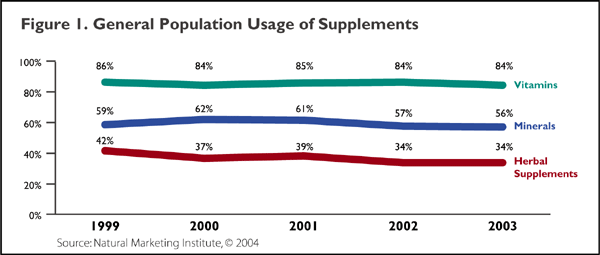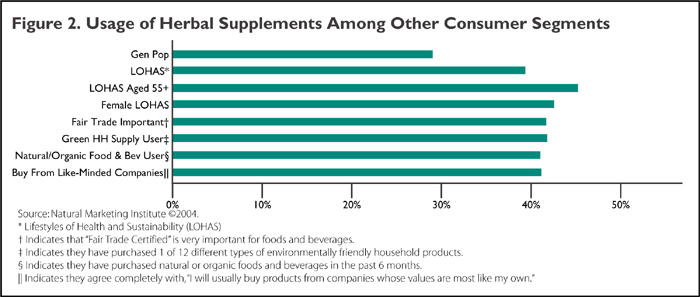Issue: 65 Page: 60-61
Herb Consumers' Attitudes, Preferences Profiled in New Market Study
by Gwynne Rogers
HerbalGram. 2005; 65:60-61 American Botanical Council
As noted by numerous surveys and econometric
tracking services, sales for herbal dietary supplements have dropped in the
past five years from their previous record high levels.1-4 This
difficult state of the herbal marketplace over the past few years has
challenged herbal supplement marketers to continually appeal to new consumers,
attempt to demonstrate the superiority of their products, and find new ways of
promoting their products.
In such a market, the value of consumer research increases substantially because
the cost of a misstep is magnified. The Natural Marketing Institute (NMI), a leading
market research and strategic consulting firm, has researched the natural products
marketplace since 1990. Its Health and Wellness Trends Database (HWTD) currently
has five years of trended consumer data, with the sixth study just recently fielded.
(A report on NMI’s previous consumer research was published in HerbalGram 54.5)
According to the HWTD, 34% of the U.S. general population used herbal supplements
in the previous year (i.e., prior to the June 1, 2003 survey date).6
This represents a market of over 60 million adults; and while it is constant relative
to a year ago (i.e., relative to the last half of 2002 and the first half of 2003),
the data reflects a decline in usage over the past five years (Figure 1).

NMI has identified a more integrated group of users: those
who have used herbal supplements for more than a year on a regular and
consistent basis. This group represents 14% of the general population. Compared
to vitamins and minerals, of which 50% of the general population can be
described as integrated users, one can see that while vitamins and minerals
have mainstreamed, regular, integrated use of herbal supplements is still
limited to a small group of consumers, relative to the potential. Based on this
research, and other similar studies, NMI finds strong evidence of the
importance of targeting consumers and understanding the benefits consumers
seek.
First, optimizing the consumer target is critical for
efficiently using marketing dollars. NMI has found that simple demographic
targets are not as effective for products such as herbals—interest in herbals
crosses age, gender, and income boundaries. Understanding consumers’ attitudes
and lifestyle is a more productive means of identifying targets.
One segment NMI found to be particularly fruitful for
products such as herbals is the LOHAS consumer. “LOHAS” stands for “Lifestyles
of Health and Sustainability,” and LOHAS consumers represent approximately one
in every three U.S. adult consumers.7 They are driven by their
interest in health, wellness, the environment and society, and they buy
products accordingly.NMI identifies
these consumers using a proprietary, 16-variable attitudinal segmentation
model.This statistical analysis
includes questions such as importance of sustainable manufacturing, concern
about worker rights, and willingness to pay more for environmentally
responsible products.
The behavior of LOHAS consumers is consistent with their
attitudes. For example, they are heavier users of organic foods, more likely to
practice yoga, heavier natural products channel shoppers (i.e., they tend to
shop in natural food stores for some or all of their supplements and food
items), and more likely to be members of environmental organizations. And,
almost 40% of them use herbal supplements—a rate 37% higher than that of the
general population.
For example, the data in Figure 2 show that a combination of
attitudes, other product usage patterns, and some demographics can identify
much more fertile consumer target groups.7

Second, it is important to understand why consumers use herbal supplements.
According to the HWTD, the primary reason integrated herbal supplement users use
them is for overall health and wellness (71%). Usage of herbs for treating or
preventing specific health issues is statistically equivalent, at 35%.
Herbal supplements also satisfy an interest among users to
lead a more healthy and natural lifestyle.Looking at numerous lifestyle measures, herbal supplement
users are simply more intense about the beliefs they hold, the role of health
and wellness in their lives, and the activities in which they participate. For
example, 36% of herbal supplement users are LOHAS consumers (more than
one-third higher than in the general population). This plays out in several
attitudes, such as the importance of spirituality (with 58% of herbal
supplement users stating they care about spirituality, versus 47% of the
general population), and environmental issues (with 24% of herbal supplement
users saying they prefer to purchase products manufactured in a sustainable
way, versus 16% of the U.S. population).
These attitudes pervade not just their usage of dietary
supplements, but other healthy products.Herbal supplement users are 32% more likely to buy energy and nutrition
bars than the general population, 59% more likely to buy organic foods and
beverages, and 54% more likely to buy soymilk or other soy beverages. This
pattern holds across natural personal care products, socially responsible
investing, green building products, and natural household products. Usage of
these products leads them to be heavier shoppers in natural channel stores;
they shop at stores such as GNC, Trader Joe’s, Whole Foods, and Wild Oats 40%
more than the general population. And, perhaps not surprisingly, herbal
supplement users also consume more healthy products, spending approximately 50%
more on supplements each month than the general population.
Therefore, when all of these attitudes and behaviors are
viewed in aggregate, an interesting trend becomes apparent: herbal supplement
users are not just buying a supplement that treats or prevents a particular
medical condition, they are looking for a natural approach to maintaining their
health and wellbeing across most of their consumer behavior. These consumers
want herbal products that provide the primary benefit of treating or preventing
a specific health issue while improving their overall health and wellness. They
also have an emotional need for a product that is pure, natural, and has a
minimal planetary and societal impact.
Gwynne Rogers is a Strategic Marketing Analyst at The Natural Marketing
Institute in Philadelphia. NMI provides in-depth market trend analysis and consumer
attitude surveys in the natural products industry. More at www.nmisolutions.com.
References:
1. Blumenthal M. Herbs Continue Slide in Mainstream Market:
Sales Down 14 Percent. HerbalGram.
2003;No. 58:71.
2. Blumenthal M. Herb Sales Down in Mainstream Market, Up in
Natural Food Stores. HerbalGram.
2002;No. 55:60.
3. NBJ’s Annual Industry Overview 2004. Nutrition
Business Journal. May/Jun 2004;5(6):1,
3-15.
4. NMI’s Health and Wellness Trends Database.Philadelphia: Natural Marketing
Institute, 2004.
5. Molyneux M. Consumer Attitudes Predict Upward Trends for
the Herbal Marketplace. HerbalGram.
2002;No. 54:64-65.
6. NMI’s Health and Wellness Trends Database, © 2004. [Note:
Data based on responses of more than 2,000 in June 2003 U.S. primary grocery
shoppers, bringing the total number of respondents in the database to over
10,000.The data gathered are
statistically significant to ± 2% at the 95% confidence level.]
7. NMI’s LOHAS Consumer Trends Database, © 2004. [Note: Data
based on responses of more than 2,000 U.S. general population adults, bringing
the total number of consumers in the database to 6,000. The data gathered are
statistically significant to ± 2% at the 95% confidence level.]
|